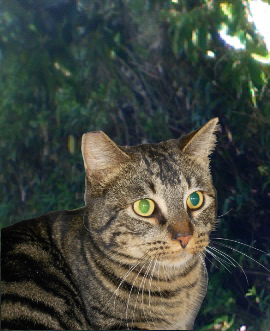|
The Feline Immunodeficiency Virus Vaccine

THE FIV VACCINE –
WHY THIS HOSPITAL IS SAYING NO
AS OF 2017, THE FORT DODGE/BOEHRINGER INGELHEIM VACCINE
WILL NO LONGER BE MARKETED FOR THE U.S. AND CANADA
|
If you are like most of the cat owning community, you may have a vague familiarity with the FIV virus but are unclear on the details. You may not even be sure about the difference between the FIV virus and the FeLV virus and you rely on your veterinarian to tell you what you need to know.
Fortunately, for most cat owners the FIV virus has been an academic matter. A new kitten receives a screening test usually for both FIV and FeLV and cats are often re-tested when they are ill but since most of our feline patients live their entire lives indoors, the FIV virus is not of much concern.
For outdoor cats, it is a whole other story. The FIV virus, or “Feline Immunodeficiency Virus,” is spread by bite wounds between cats. Adult cats, rather than kittens, are at risk and the American Association of Feline Practitioners recommends that outdoor cats be tested annually for this virus and as well as for the Feline Leukemia Virus (the “FeLV” virus) regardless of their vaccination status.
FIV, like HIV, can live in its host’s body for years before leading to a life-threatening AIDS situation. Ultimately, FIV is suppressive to the immune system and predisposes the cat to numerous opportunistic infections and even cancers.
In August 2002, Fort Dodge Animal Health (now part of Boehringer Ingelheim) released a vaccine for FIV and promoted it heavily. Our hospital has looked long and hard at this vaccine which, on the surface, seems like a good idea for outdoor cats or cats living with FIV positive housemate cats. We have chosen to say no to this vaccine at least until more information is available and are happy to list the features of the product that leave us with reservations.
|

Local feral cat sterilization programs
commonly involve removing the tip of
an ear to designate a cat as neutered.
(original graphic by marvistavet.com)
|
- There are five strains of FIV virus, called “Clades.” The vaccine was made using Clades A and D and tested using Clade A. Clade B, for example, is a very common strain in most regions of the U.S. It turns out the response to the vaccine has been variable between different Clades and there is a great deal (up to 15%) of genetic variability even within the same Clade. The vaccine might not be effective at all against the Clade that is most common in certain regions. This means that a pet owner might wrongly believe they were protecting their cat fully against the FIV virus with this vaccine. California has both Clades A and B.
- The FIV vaccine is an “adjuvanted” vaccine. An adjuvant is an additive used with killed vaccines to improve their ability to stimulate the immune system. Unfortunately, adjuvanted vaccines have been implicated in the development of certain tumors in the cat. (For more information on vaccine-associated sarcomas click here). Our hospital currently uses no adjuvanted vaccines for cats and has no desire to administer a vaccine that stimulates tumor growth even under rare circumstances.
- Vaccinated cats will test positive on all current methods of testing for the FIV virus. This means it will no longer be possible to distinguish vaccinated cats from truly infected cats. The vaccine is advertised at protecting 82% of cats which means 18% can still be infected. This is nearly a one in five chance of unknowingly having an infected cat.
The American Association of Feline Practitioners considers this a non-core vaccine. To view the Retrovirus Management Guidelines, visit:
www.catvets.com/guidelines/practice-guidelines/retrovirus-management-guidelines
To read the AAFP Fact Sheet on FIV, visit:
https://catvets.com/public/PDFs/PracticeGuidelines/Guidelines/Vaccination/FelineImmunodeficiencyVirus_FactSheet.pdf
FIV infection is preventable by keeping cats indoors and preventing cat fights.
Owning an FIV+ Cat

Page last updated: 6/14/2019
|